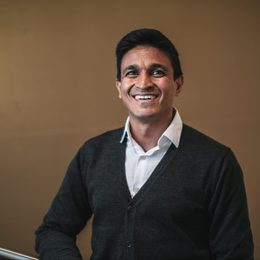Day 2
Registration opens
In-person participants will be able to register at the reception of the Blavatnik School of Government building and enjoy tea, coffee and pastries with other in-person attendees and speakers.
Governance & institutional logics in outcomes-focused partnerships
SIB partnerships feature the collaboration of stakeholders from different sectors with individual institutional logics. Likewise, SIBs are implemented across different welfare regimes, potentially influencing how the different logics play out in a SIB. This session seeks to explore how tensions between the different institutional logics are mitigated within a SIB partnership, using a comparative lens of different welfare regimes across Europe.
Watch the recording of the session here.
Presentations
Bertelsmann Stiftung initiated two Social Impact Bonds in Germany in 2017 with the goals of “Strengthening Prevention in Family Assistance Programmes in the District of Osnabrück” and “Improving Educational Opportunities …

Cornelia Nyssing
Bertelsmann Foundation's Sustainable Social Market Economies Programme
Governing authorities alone are not able to solve the great challenges of our times. Social Impact Bonds (SIB), a financing instrument in which (private) donors invest in social projects, have …

Antonia Muhr
Vienna University of Economics and Business

Julia Bahlmann
University of St. Gallen
This study is framed within the public management stream of studies in an attempt to investigate the potential role in creating (or destroying) public value through social impact investing schemes, …

Lavinia Pastore
Open Impact

Giulio Pasi
European Commission
Luigi Corvo
University of Milan Bicocca
Introduction
This paper responds to the second theme of the 2022 Social Outcomes Conference exploring the governance and leadership arrangements of outcomes-based contracting through a qualitative case study of the …

Alec Fraser
King's College London
Nonprofit organisations (NPOs) are frequently part of multi-sectoral networks delivering public services. These cross-sector collaborations feature, due to partner diversity (Huxham & Beech, 2003), multiple institutional logics. These logics are …

Franziska Rosenbach
Government Outcomes Lab
Theme: Outcomes-based contracting
Roundtable 2.1 Evidence and practical insights from the UK’s Life Chances Fund projects
Launched in 2016 by the UK Government, the Life Chances Fund (LCF) is a £70m fund which aims to help those people in society who face the most significant barriers to leading happy and productive lives. It contributes to outcome payments for locally commissioned social outcomes contracts which involve socially-minded investors through impact bonds. Running until 2025, the LCF aims to support over 51,000 individuals to achieve better life outcomes in areas such as health, employment, and housing.
All funded projects are now in implementation, with a wealth of learning coming out of delivery. This provides an exciting opportunity to celebrate what the projects have achieved so far, reflect on lessons learnt and explore how these achievements can be sustained beyond the life of the impact bond.
You can find out more about the Government Outcomes Lab's role in evaluating the LCF here.
The Roundtable will be an opportunity to explore with LCF project stakeholders the successes and lessons learnt so far from the delivery of these innovative projects; reflect on key questions around sustaining the impact of these projects beyond the LCF; and offer projects a platform to showcase their results and learn from each other.
For the session, we are seeking to bring together emerging insights from the research conducted by the GO Lab with practical insights from projects themselves, in an interactive discussion centred around three core topics:
- Unlocking collaboration at local level & empowering civil society
- The value added of outcome-focused partnership working
- Sustainability beyond the life of the impact bond
For those attending the Roundtable in person, the session will be followed by informal networking for an opportunity to connect directly with peers from other Life Chances Fund projects, as well as representatives from the National Lottery Community Fund and the Department for Digital, Media, Culture & Sport.
Watch the recording of the session here.

James Magowan
CSY Directorate, DCMS (UK)

Roger Winhall
The National Lottery Community Fund

Sangita Patel
Substance

Emma Hanley
Kirklees Council

Richard Johnson
Healthy Brains Global Initiative

Neil Stanworth
ATQ Consultants

Mila Lukic
Bridges Outcomes Partnerships

Liam Thornton
Social Finance UK

Esther Murray
Futures for You

Tanyah Hameed
Social Finance

Sarah Cooke
Bridges Outcomes Patnerships

Victoria Jones
Bridges Outcomes Partnerships

Sarah Cubitt
Children's Services, Norfolk County Council

Dr Eleanor Carter
University of Oxford
Chair

Andreea Anastasiu
University of Oxford
Chair
Theme: Outcomes measurement & value for money
Roundtable 2.2 Balancing act: measuring what matters in outcomes-based partnerships
It is widely accepted that setting out the intended outcomes for people targeted by a social programme provides a useful articulation of the ultimate aim of that programme. But does that mean these outcomes should be measured quantitatively? And how should those numbers be used during ‘live running’?
This roundtable will explore the range of information that cross-sector partners should use to course-correct during programme delivery, and inform practice beyond. ‘Measurement for learning’ sounds like a good idea, but how do you make people do it? How accurate do your measures need to be? And who gets to see the information and make the decisions?
Watch the recording of the sessionhere.
Presentations
The term rigorous evaluation is most commonly associated with research designs that have strong counter-factual evaluation designs: both randomized control trials and quasi-experimental designs. Such designs require adequate sample size …

Professor Gary Painter
University of Southern California

Professor Chris Fox
MMU

Hilary Olson
Research consultant
Sandor Gellen
Manchester Metropolitan University
The Young Person Homeless Prevention Pathfinder is an outcomes partnership established to prevent homelessness amongst young people across Greater Manchester. The service has been delivered since January 2021, first as …

Conor Sullivan
Bridges Outcomes Partnerships
Rachel O'Connor
Greater Manchester Better Outcomes Partnership
Steve Marsland
Homelessness Outcomes Partnerships
Pasifika Futures is a non-governmental charitable company, commissioning social outcomes for Pacific families across New Zealand through an innovative, culturally anchored programme called Whānau Ora. Our focus in Pasifika Futures …
Debbie Sorensen
Pasifika Medical Association and Pasifika Futures Limited

Seini Jensen
Pasifika Medical Association and Pasifika Futures Limited
While most policy makers, political representatives as well as service providers agree in principle that a strive to define and organise their work towards improved outcomes is the right way …

Tomas Bokström
Social & Health Impact Center, RISE
Third-party evaluation is a critical component of the results-based financing (RBF) model given the disbursement of funds is tied to the verification of outcomes. The reliability of evaluation results is …

Adriana Balducci
Education Outcomes Fund
While all SIBs are outcomes-based, there are also some SIBs, whose performance will consider the service delivered. This latter category of SIBs is designed when SIBs claim to test the …
Emilia Tshimanga Muteba Wagny
University of Liege
The sluggish economy and fiscal crunch has caused the increased interest of outcome-based contracts including social impact bond (SIB) in Japan, especially since 2015. National government has learned lessons from …

Ichiro Tsukamoto
Meiji University

Dr Chih Hoong Sin
Independent
Break
Theme: Measuring outcomes & value for money
Data with a purpose: Insights from an emerging learning collaborative for outcomes-based partnerships
Data plays a key role in outcome-based partnerships. Those working on outcomes-based projects are generating an immense volume and variety of data. This brings new urgency to the task of navigating, connecting and sensemaking to unlock data to inform practice.
In this session, we will explore the latest developments on data across two themes: the function of data stewardship and machine learning. Firstly, we will introduce a pioneering programme to support a global network of data stewards and discuss how this network can help unlock more data on social outcomes projects.
We will then consider the tantalising power of machine learning techniques to meet the challenges posed by an unwieldy volume of literature on outcomes contracting. There will be an interactive demonstration of a prototype evidence navigation tool designed to help practitioners and policy makers traverse the large body of evidence around outcomes-based contracts.
Participants will have the opportunity to provide feedback and have a say in how we move forward with these data initiatives.
Watch the recording of the session here.

Dr Mara Airoldi
University of Oxford

Sandro Cabral
Insper Metricis

Julia Greenland
CIFF

Professor Rob Procter
University of Warwick/Alan Turing Institute

Miguel Arana Catania
University of Warwick/Alan Turing Institute

Zheng Fang
University of Warwick
![Iman_Bilal_pic[58]](https://golab.bsg.ox.ac.uk/images/Iman_Bilal_pic58.2e16d0ba.fill-260x260.jpg)
Iman Bilal
University of Warwick

James Westhead
Big Society Capital

Dr Eleanor Carter
University of Oxford
Chair
Theme: Procurement and social value
Deep Dive 2.1 Outcomes are knotty for public procurement
Procuring services on an outcomes basis – instead of an activities basis – is different. This session explores these differences looking at market engagement, requirements specification, procurement procedures, tender evaluations, contract design, payments, contract modifications, and oversight from the perspective of public procurement professionals
Watch the recording of the session here.
Presentations
A survey of Social Impact Bonds (SIBs) in homelessness space depicts how partnerships with the third sector organizations have predominantly focused on the housing first approach. Such approaches though form …

Nadiya Parekh
Sonoma State University
Public procurement of food is now a widely used practice in Latin America to include marginalised smallholder producers in local economies and supply chains and to address hunger and malnutrition …
Marcos Rodriguez Fazzone
United Nations Food and Agriculture Program

Felipe Roa-Clavijo
Andes University
“It can’t be done here”, an oft-repeated phrase heard across UK military establishments, is the standard refrain towards developing innovative ideas to improve the lived experience or social outcomes of …
Dr. Elizabeth Newman-Earl
e50K Consultancy
This presentation will share highlights from the (forthcoming) Social Outcomes Contracting in Europe -- Procurement Guide published by the European Investment Bank on the European Investment Advisory Hub. Social Outcomes …

Dr Ruairi Macdonald
Faculty of Law, University of Oxford

Mayra Gramani
Education Outcomes Fund
In the outcomes-based commissioning ecosystem, significant attention has (rightly) been paid so far on the design of payment functions for implementers – choosing metrics, pricing outcomes and setting targets. Less …

Stephen Chandler
Education Outcomes Fund
Theme: Outcomes-based contracting
Deep Dive 2.2 Exploring the role of outcomes-based contracting for environmental management
From net-zero carbon emissions to restoring biodiversity, recognition of the existential threat posed by climate change has led to a wide variety of commitments from governments, multilateral organisations, NGOs, and private enterprises. Achieving the desired aims will require innovation, more investment and more efficient spending, and greater partnership between the public and private sectors. What is the role of outcomes-based contracting (OBC) in this ‘green agenda’? This session aims to summarise the current state of environmental OBC and consolidate lessons learned from existing programmes.
Watch the recording of the session here.

Michael Rieser
UBS Optimus Foundation

James Ronicle
Ecorys
Chair
Presentations
Improving the health of our planet is arguably the biggest challenge human-kind faces today. We need to restore the health of our land and oceans, capture harmful carbon from the …

Amit Shah
Bridges Outcomes Partnerships
The Green Outcomes Fund is a first-of-its-kind climate finance structure which uses outcomes-based contracting to crowd in private capital investment. A key objective of the GOF is to support investment …

Dr. Jason Van Staden
Bertha Centre
In March 2022, the World Bank issued the $150 million Wildlife Conservation Bond (WCB). This development impact bond channels investor funds to achieve conservation outcomes measured by an increase in …

Elisson Wright
World Bank
Outcomes-based approaches to environmental management and climate change mitigation have been implemented in a variety of contexts, including waste management, agriculture, and energy. While a body of evidence about such …

Dr Harry Bregazzi
University of Oxford
Theme: Outcomes-based contracting
Deep Dive 2.3 Let’s be friends: outcomes contracts & relational contracting
Outcomes-based contracts bring together parties from different backgrounds in a long-term partnership where collaboration is key. However, a more traditional, transactional approach to contracting may lack many of the features needed for success.
In this session, we’ll explore whether a "formal relational” approach to contracting might help to achieve better social outcomes.
Watch the recording of the session here.

Daniella Jammes
Freshfields Bruckhaus Deringer LLP

Gary Wallace
Plymouth City Council

Professor Stéphane Saussier
Sorbonne Business School
Chair
Presentations
Impact bonds and other pay by results transactions share a focus on serving a designated beneficiary population, many of whom may be the least able to manage catastrophic risks and …

Deborah Burand
NYU School of Law

Louise Savell
Social Finance
Central question and main issues analysed
Various commentators have seen Social Impact Bonds (SIBs) as implementing practices associated with New Public Management and/or neo liberal ideas (e.g. Dowling 2017, Warner …

Lee Whitehead
Manchester Metropolitan University

Professor Chris Fox
MMU
Government agencies have increasingly turned to complex multi-actor contracts and public-private partnerships (PPPs) to outsource social services. When these contracts do not deliver as promised, the consequences can be severe, …

Professor Carolyn Heinrich
Vanderbilt University

Deanna Malatesta
Indiana University
This presentation discusses a project governed by an outcomes-based contracting arrangement, the Kirklees Better Outcomes Partnership, through the lens of formal relational contracting. It analyses how relational aspects of the …

Dr Felix-Anselm van Lier
University of Oxford
Building on a practitioner focused guide being developed by the GO Lab, Michael and Nigel will share insights on the different reasons to take a more relational approach to contracting …

Nigel Ball
Social Purpose Lab

Michael Gibson
University of Oxford
Theme: Outcomes-based contracting
The work never stops: how do we make social change stick? Lessons from outcomes-based partnerships and beyond
Outcomes-focused partnerships around the world come in many shapes and forms, but most are underpinned by an ambition to leave a lasting legacy that improves the ecosystem in which they operate.
Whether it’s through building a culture of trust and collaboration between organisations in different sectors, improving service delivery through data-driven learning and adaptative management, or working flexibly to innovate to maximise social impact, outcomes-focused partnerships have been seen as a promising way to address systemic delivery failures and strengthen institutional capacity within government. What are the mechanisms by which these outcomes-focused partnerships can help build institutional capacity? What are the limitations? What have we learnt from them about how to strengthen the design and implementation of social programmes? What can we learn from other approaches about how outcomes-focused approaches can have sustainability built-in from the start?
This discussion will bring together a rich mix of policymaker and practitioner perspectives from around the world for an in-depth exploration of the engines of impact that can strengthen the long-term legacy of outcomes-focused partnerships.
Watch the recording of the session here.

Louise Savell
Social Finance

Ben McAdams
Former Congressman and Mayor

Thomas Kenyon
World Bank

Andy Brown
Anglian Water Group

Val Keen
UK Government

Professor Carolyn Heinrich
Vanderbilt University

Avnish Gungadurdoss
Instiglio

Andreea Anastasiu
University of Oxford
Chair
How do we make things happen on the ground? In conversation with Stefan Dercon
The announcement of a new public policy is always a moment that focuses attention. But what happens next? How does change actually take place – or not? How do we know it is indeed a positive change? And if it is, how is it made to stick?
In this public talk, GO Lab academic director Mara Airoldi will be hosting a discussion with Professor Stefan Dercon, Professor of Economic Policy at the Blavatnik School of Government. Prof Dercon has been conducting research and advising governments around the world for decades, working both as an academic professor and a senior policy advisor. He will share his insights on how to achieve mission alignment from senior stakeholders and shared commitment to action from those involved in the implementation, as well as building in timely learning practices. Please bring your burning questions and experiences on ways to link policy and delivery to achieve better outcomes.
About Professor Stefan Dercon
Professor Stefan Dercon combines his academic career with work as a policy advisor, providing strategic economic and development advice, and promoting the use of evidence in decision making. Between 2011 and 2017, he was Chief Economist of the Department of International Development (DFID), the government department in charge with the UK’s aid policy and spending. Since 2020, he has been the Development Policy Advisor to successive Foreign Secretaries at the UK’s Foreign, Commonwealth and Development Office.
His research interests concern what keeps some people and countries poor: the failures of markets, governments and politics, mainly in Africa, and how to achieve change.
His latest book, Gambling on Development: Why some countries win and others lose was published in May 2022. It draws on his academic research as well as his policy experience across three decades and 40-odd countries, exploring why some countries have managed to settle on elite bargains favouring growth and development, and others did not. Previously, Dull Disasters? How Planning Ahead Will Make A Difference was published in 2016, and provides a blueprint for renewed application of science, improved decision making, better preparedness, and pre-arranged finance in the face of natural disasters.
Watch the recording of the session here.

Professor Stefan Dercon
University of Oxford

Dr Mara Airoldi
University of Oxford
Chair
Close of conference & drinks reception
Enter access code
Submit the event access code to reveal the session/meeting credentials.
